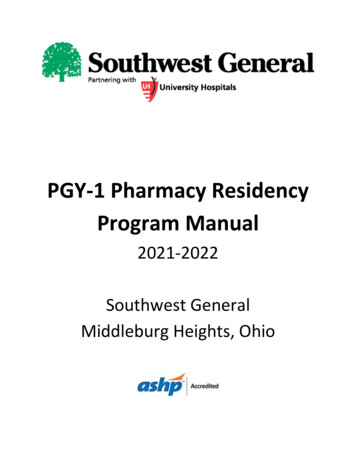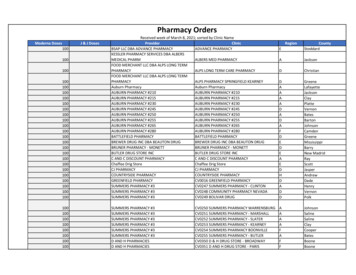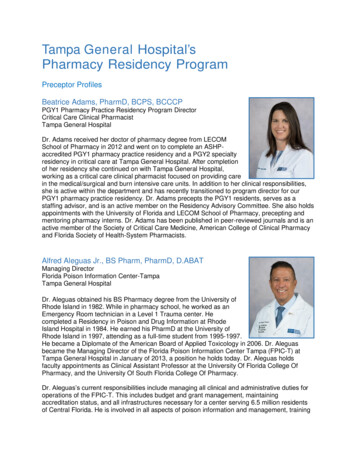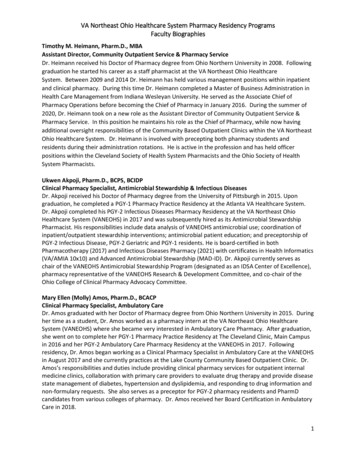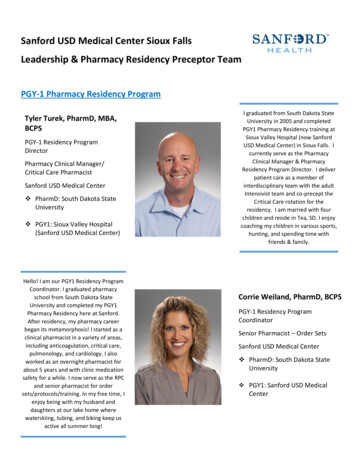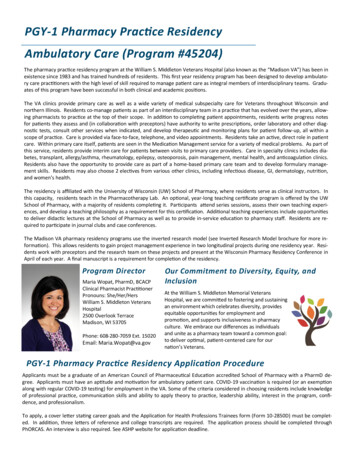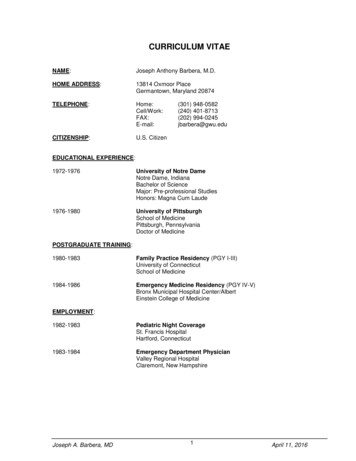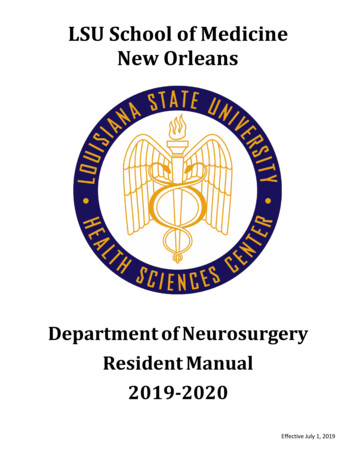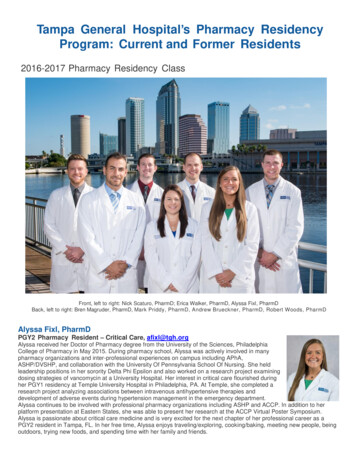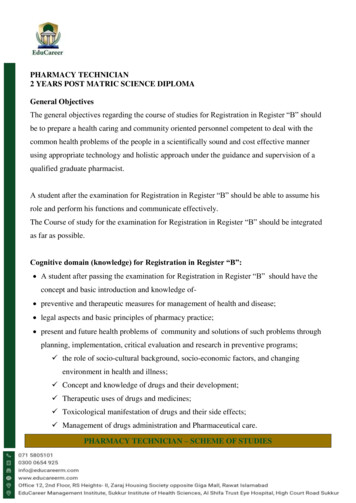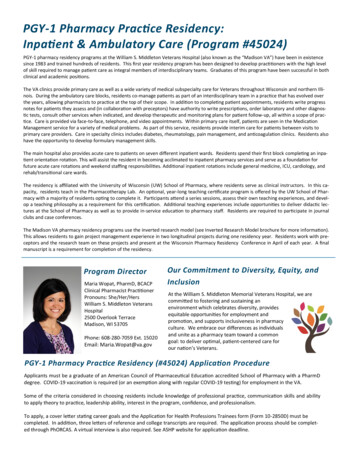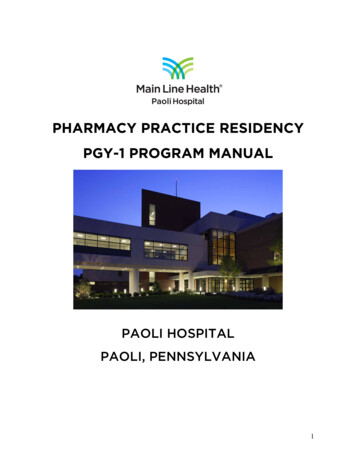
Transcription
PHARMACY PRACTICE RESIDENCYPGY-1 PROGRAM MANUALPAOLI HOSPITALPAOLI, PENNSYLVANIA1
TABLE OF CONTENTSContact informationAbout Paoli HospitalTransportation to Paoli Hospital and parkingMap of Paoli Hospital campusResidency general background and purpose statementThe Paoli Hospital Pharmacy DepartmentPGY-1 required competency areas and educational goalsPaoli residency program rotationsApplication processCandidate qualificationsPaoli Hospital Residency Advisory CommitteeResidency program structureResidency requirementsResidency obligations of the programResidency preceptor development programResidency evaluations and guidelinesPaoli Hospital Pharmacy Residency general 23-2728-30Resident expectationsRotations – requiredRotations – electiveRotations – longitudinalAppendices A–DSample resident schedule 2017–18Resident 1 assignment deadlines 2017–18Resident 2 assignment deadlines 71Salary, benefits, holidays, staffing, sick time, vacation time, etc.2
CONTACT INFORMATIONAl Celidonio, RPhDirector of PharmacyPaoli Hospital PGY1 Pharmacy Practice Residency DirectorEmail: celidonioa@mlhs.orgTelephone: 484.565.1173Fax: 484.565.4997Andrea Weeks, PharmDPaoli Hospital PGY1 Pharmacy Practice Residency Co-DirectorEmail: weeksa@mlhs.orgTelephone: 484.565.1144Fax: 484.565.3388Pharmacy website: mainlinehealth.org/paoli/pharm-residency3
ABOUT PAOLI HOSPITALThe CommunityPaoli Hospital is a 231-bed community hospital located about 15miles outside of Philadelphia, Pennsylvania. Paoli Hospital wasfounded in 1913 and has been a health care leader in ChesterCounty, Pennsylvania. Paoli Hospital is part of a larger healthcare system called Main Line Health. The Main Line Healthsystem includes four acute care hospitals—Lankenau MedicalCenter, Bryn Mawr, Paoli and Riddle hospitals—a physicalrehabilitation hospital, Bryn Mawr Rehab Hospital, a drug andalcohol rehabilitation center, Mirmont Treatment Center,outpatient centers, home care services, physician practices, aresearch institute and a host of other facilities and services.Paoli Hospital is recognized regionally and nationally for outstanding medical andsurgical services, sophisticated technology and a personalized approach to medical andnursing care. Paoli has many specialized services including a level II trauma center,cancer center and a neonatal ICU. There is a hospitalist group that provides care for amajority of medical patients.Paoli Hospital has achieved The Joint Commission Gold Seal of Approval in: Breast cancer Hip and knee replacement Cardiovascular services Sleep medicine COPDMost recent awards: Nurses Improving Care for Healthsystem Elders (NICHE) Designation 2018 Mission: Lifeline – GOLD for quality of care in heart attack, stroke andcardiac arrest patients 2005–15 Magnet Designation, American Nurses Credentialing Center 2018–19 Best Regional Hospital, U.S. News and World Report 2015 Best Hospitals for Common Care, U.S. News and World Report 2014, 2015, 2017 Guardian of Excellence Award for Patient Experience inInpatient Care, Press Ganey 2014 Top Performer for heart attack, heart failure, pneumonia, stroke andsurgical care; The Joint Commission 2013 Gold Seal of Approval for stroke care, hip and knee replacement, breastcancer care, sleep disorders and outpatient COPD; The Joint Commission Beacon Award-American Association of Critical-Care Nurses ICU-Gold,Progressive Care Unit-Silver Best Places to Work by Philadelphia Business Journal 2013 Excellence in Health Care Compliance Award, PA Department of HealthVisit our website at mainlinehealth.org/paoli/honors-awards for more awards andhonors.4
TRANSPORTATION TO PAOLI HOSPITALPaoli Hospital255 West Lancaster AvenuePaoli, PA 19301General driving directionsFrom the NorthTake the Pennsylvania Turnpike (I-476 South to I-276 West) to the Valley ForgeInterchange (Exit 326). One-quarter mile beyond the toll booths, take Route 202 Southtwo miles and exit right on Route 252 South (Paoli Exit). At Route 30, turn right (West)and proceed one mile. The hospital will be on your right.From the SouthTake I-95 North to Route 322. Follow Route 322 to Route 202 North to the Route 29(Great Valley/ Malvern) Exit. Turn right and continue to Route 30 East (LancasterAvenue). Turn left on Route 30, and continue traveling eastbound. The hospital will beon your left.From the EastTake I-76 West to Route 202 (Exit 328, West Chester/Pottstown). Take Route 202South to Route 252 South (Paoli Exit). Turn right onto Route 30 (West). The hospital willbe on your right.From the WestTake the Pennsylvania Turnpike East to the Valley Forge Interchange (Exit 326). Onequarter of a mile beyond the toll booths, take Route 202 South. Travel two miles onRoute 202 to Route 252 South (Paoli Exit). Turn right onto Route 30 (West) andproceed one mile. The hospital will be on your right.Public transportationTo map your trip or to find out about possible delays, visit the SEPTA site.5
From Center City Philadelphia and West to PaoliBy Train: From Philadelphia’s 30th Street Station, Suburban Station, or Market EastStation, take SEPTA’s Regional Rail Paoli/Thorndale Line to Paoli. Paoli Station islocated approximately one mile east of Paoli Hospital on Lancaster Avenue (Route 30).Taxi service can be called from the station.From the AirportThe SEPTA Regional Rail Airport Line runs from the Philadelphia International Airportto 30th Street Station, where you can take SEPTA's Regional Rail Paoli/ThorndaleLine to Paoli.Parking LocationsParking at Paoli Hospital is complimentary. Please follow the signs as you enter thecampus for our parking garage. Valet parking is available at the valet entrance.Handicapped persons will receive complimentary valet parking. There is a handicap lotadjacent to the valet entrance with numerous spaces as well as several handicapspaces that are located on the street level of the south garage.6
Paoli Hospital campus mapLobbyPark in garage andwalk over to themain lobby to meetfor your interview.7
GENERAL BACKGROUNDAs part of the Main Line Health system, Paoli Hospital is proud to offer acomprehensive; ASHP accredited postgraduate year one (PGY-1) general pharmacypractice residency in an interdisciplinary setting. As a resident you will play a key role inthe development and implementation of patient treatment plans in collaboration with adedicated team of health care professionals. Additionally, you will play an integral partof Paoli’s mission to provide a superior patient experience. The Paoli Hospital residencyprogram offers each resident the opportunity for instruction and mentoring pharmacystudents, lending advice to medical staff, as well as, other health care providers withinour institution. The residency program at Paoli Hospital offers residents the opportunityto customize their learning experiences to match with personal career goals.PURPOSE STATEMENTThe PGY-1 general pharmacy practice residency program at Paoli Hospital will provideexceptional training experiences that will develop the resident both clinically andprofessionally. The purpose of the residency program is to prepare pharmacists in amultitude of direct patient care experiences. Upon completion, residents will develop thenecessary confidence, competence, and proficiency essential for launching a career inhospital pharmacy.8
THE PHARMACY DEPARTMENTAT PAOLI HOSPITALThe Paoli Hospital Pharmacy Department focuses on patient care services, educationalopportunities and interprofessional research. The pharmacy team consists of onepharmacy director, one pharmacy manager, one clinical coordinator, seven clinicalpharmacy specialists, 24 staff pharmacists, one inventory control coordinator, onetechnician supervisor and 20 technicians. Throughout the year, various members of thepharmacy team mentor and precept undergraduate and graduate students fromPhiladelphia College of Pharmacy (PCPS), Jefferson School of Pharmacy, and TempleUniversity School of Pharmacy.The pharmacy is decentralized, consisting of satellites. The pharmacy at Paoli Hospitalservices all 231 inpatients, as well as a number of outpatient sites located at thehospital or off-site: Ground floor pavilion pharmacy located near the emergency room, staffed 24/7including weekends and holidaysGround floor main building pharmacyIV room in ground floor main building pharmacy, prepares bulk parenteralsEmployee prescription pick-up area ground floor main building pharmacyOR satellite pharmacy located on first floor pavilion buildingPYXIS pharmacy located on third floor main buildingOutpatient cancer center located in Medical Office Building 3Outpatient cancer center located at the Main Line Health Center at Exton Squareand the Main Line Health Center in CollegevilleOccupational health located in the Main Line Health Center at Exton SquareClinical pharmacy specialists (7)o Critical care/traumaᴼ Infectious diseaseo Internal medicineᴼ Surgical careo Emergency medicineᴼ Hematology/oncologyEach patient care area is equipped with automated dispensing cabinets (PYXIS),allowing ease of access to medications. Beginning in March 2017, Paoli Hospitalembarked on a new medication distribution model, a decentralized PYXIS model. Thisis a collaborative effort between nursing and pharmacy leaders.This new model is exciting for many reasons:1) It will place medications at the point of care2) Eliminate the delays associated with dispensing medications from the pharmacy3) Reduce and in some cases eliminate time spent filling routine medications,checking the medications, and delivering them to floors4) Nursing will no longer have to wait for new orders or missing medications5) Safe administration of medications is enhanced by using profile dispense onPYXIS and MAK at the bedside.9
To strive for continual patient safety, computerized prescriber order entry for electronicmedication ordering is integrated with electronic health records and the pharmacyinformation systems. Bedside medication bar code scanning and “smart” infusion pumptechnology is utilized by nursing when administering medications. Pharmacists utilizeintegrated medication surveillance applications for medication and adverse eventreporting, identification of medication-related problems and monitoring of drugtherapies.10
PAOLI HOSPITAL PGY1REQUIRED COMPETANCY AREASAND EDUCATIONAL GOALSUpon successful completion of the program’s curriculum and experiential training, theresident will demonstrate that he/she is competent and proficient in his/her ability to:Competency area R1: Patient careGoal R1.1:In collaboration with the health care team, provide safe and effectivepatient care to a diverse range of patients, including those with multipleco-morbidities, high-risk medication regiments, and multiplemedications following a consistent patient care process.Goal R1.2:Ensure continuity of care during patient transitions between caresettings.Goal R1.3:Prepare, dispense, and manage medications to support safe andeffective drug therapy for patients.Competency area R2: Advancing practice and improving patient careGoal R2.1:Demonstrate ability to manage formulary and medication-useprocesses, as applicable to the organization.Goal R2.2:Demonstrate ability to evaluate and investigate practice, review data,and assimilate scientific evidence to improve patient care and/or themedication use system.Competency area R3: Leadership and managementGoal R3.1:Demonstrate leadership skills.Goal R3.2:Demonstrate management skills.Competency area R4: Teaching, education, dissemination ofknowledgeGoal R4.1:Provide effective medication and practice-related education to patients,caregivers, health care professionals, students, and the public.Goal R4.2:Effectively employs appropriate preceptors’ roles when engaged inteaching.11
PGY1 RESIDENCY PROGRAM ROTATIONSThe residency program at Paoli Hospital begins on July 1st and finishes June 30th of thefollowing calendar year. If July 1st falls on a weekend the residency will begin on thefollowing Monday.Each pharmacy resident will be scheduled to complete all required rotations and twoelective rotations of their choice.Required rotations (five weeks each)General pharmacy practice and orientation (seven weeks)Internal medicineAdult critical care/traumaInfectious diseasePractice managementEmergency medicineCardiologyElective rotations (four weeks each)Medication safetyOutpatient hematology/oncologyPharmacy informaticsPain and palliative careGeneral pediatrics/NICU Nemours Alfred I. duPont Hospital for ChildrenRequired longitudinal experiencesSenior oncology program ambulatory careDrug informationProject Red: Readmission prevention initiativePharmacy and Therapeutics CommitteeNursing-Pharmacy Medication Safety CommitteePharmacy services-staffing*Pharmacy Residency Research Project*Pharmacy services-staffing requirement: Every other weekend, one summer and one winterholiday12
APPLICATION PROCESSAll candidates for the PGY1 residency program at Paoli Hospital will participate in theASHP Residency Matching Program.The following materials must be submitted by the second Friday in January: Letter of intent Current curriculum vitae Preference to applicants with hospital pharmacy experience College transcript(s) Three letters of recommendationPreferred application process:PhORCAS-Pharmacy Online Residency Centralized Applicant Service Completed application packets will be reviewed by members of the ResidencyAdvisory Committee (RAC) to determine candidates that most closely match thePaoli Hospital program goals and opportunities. Selected candidates will be invited to an onsite interview with members of theRAC. Following the interview process, residency candidates will be ranked based uponthe collaborative input from the RAC with regard the interviews and qualificationsof the candidate. A rank list will be submitted to the Residency Matching Program. Applicants invited for an interview will be provided information on programpolicies including leave of absence, resident expectations and requirements forsuccessful completion of the program.13
CANDIDATE QUALIFICATIONSAll candidates must: Be highly motivated Have strong desire to work as part of a collaborative team of health careprofessionals Have hospital pharmacy work experience Have completed a program in pharmacy leading to a Doctor of Pharmacy degreefrom a pharmacy program accredited by the Accreditation Council for PharmacyEducation (ACPE) Be of good moral character Be at least 21 years of age Be a citizen of the United States or have a Green Card Be eligible for Pennsylvania State licensure, with all examinations forPennsylvania State licensure successfully completed by September 30th of theresidency yearLicensure verificationThe resident will provide the department a copy of their pharmacy licensure certificate toremain on file during the resident’s year at Paoli Hospital. Failure to obtain appropriatelicensure within 90 days of starting the residency, i.e., employment (September 30th),will result in termination of employment. See associated policy on page 32.14
PAOLI HOSPITAL RESIDENCY ADVISORYCOMMITTEEThe Residency Advisory Committee (RAC) governs the residency program. Thecommittee is comprised of Paoli Hospital residency preceptors and current residents.The committee is chaired by the residency program director and meets from 12:00 pmto 1:00 pm on the second Friday of each month to review and discuss the progress ofthe residents, as well as, provide preceptor development opportunities. The preceptorsmeet during the first half of the meeting and the residents attend the second half of themeeting. Interactive feedback within the committee is utilized to direct the resident inhis/her current and upcoming residency activities and to provide mentoring andguidance in the resident’s pharmacy practice. The committee will recommendmodifications to the residents’ schedule as necessary. Meeting minutes will bedispersed to all members including residents in a newsletter format. Each member ofthe RAC is expected to: Act as an advocate for the residentProvide expertise for the residency projects (when possible) or identify otherappropriate resourcesProvide feedback and suggestions on improving current rotation sites, as well asidentifying future potential rotation sitesProvide feedback and suggestions on the current structure of the residencyprogram, and offer possibilities for future direction and quality improvementParticipate in opportunities for preceptor developmentBe involved in new resident recruitment processParticipate in resident evaluation and rankingTake part in a quarterly review of resident progress (customized plans)Discuss competency of our residents in terms of designating ACHR status ofASHP required goals and objectives for the residencyPromote resident and preceptor wellness through activities and discussions15
PAOLI HOPSITAL RESIDENCY PROGRAM STRUCTURECore rotations (five weeks)Preceptor(s)General pharmacy practice and orientation(seven weeks)Liz Ferrigno, RPhSteve Breslin, PharmDAndrea Lordan, PharmDInternal medicineKelly Butler, PharmDAdult critical care/traumaKiyo Yoda, PharmD, Clinical CoordinatorRyan Reber, MDInfectious diseaseAndrea Weeks, PharmDYoung S. Kim, MDPractice managementAl Celidonio, RPh, Director of PharmacyDaniel O’Loughlin, PharmD, Pharmacy ManagerEmergency medicineDeena Rojek, PharmDSean Young, PharmDCardiologyAndrea Weeks, PharmDKelly Butler, PharmDMatthew Levy, MDElective rotations (four weeks)Preceptor(s)Pharmacy informaticsInformation technologyAndrea Weeks, PharmD (coordinator)Heather Troup, PharmD, Pharmacy IT StaffMedication safetyLiz Ferrigno, RPhOutpatient hematology/oncologyJoe Stuccio, RPh, MSMichael B. Dabrow, DO, FACOI, FACPPain and palliative careKiyo Yoda, PharmD, Clinical CoordinatorGeneral pediatrics/NICU Nemours Alfred I.duPont Hospital for ChildrenElora Hilmas, PharmD (at DuPont)Andrea Weeks, PharmD (coordinator)Longitudinal learning experiencesPreceptor(s)Pharmacy services-staffingLiz Ferrigno, RPh, designated staff pharmacistmentorsDrug informationKiyo Yoda, PharmD, Clinical CoordinatorProject Red: Readmission prevention initiativeKelly Butler, PharmDPharmacy and Therapeutics CommitteeAl Celidonio, RPh, Director of PharmacyKelly Butler, PharmDPharmacy Residency Research ProjectAl Celidonio, RPh, Director of PharmacyPreceptor Advisors (TBD)Senior Oncology Program–ambulatory careAndrea Weeks, PharmDNursing-pharmacy Medication Safety CommitteeAl Celidonio, RPh, Director of Pharmacy16
PAOLI HOSPITAL PGY1 RESIDENCY REQUIREMENTSSuccessful completion of the Paoli Hospital PGY1 Residency Program requires theachievement of the required ASHP Residency Program Residency Learning SystemOutcomes, Goals and Objectives (outlined in detail at the beginning of the residencymanual). Each resident is required to achieve an 80 percent or better, 20 percentsatisfactory and no needs improvement on all required and selected elective residencygoals by the end of the residency year. The resident’s progress towards achieving allRLS goals will be monitored and shared with RAC members at least quarterly by theresidency program director or co-director. At the midpoint of the program each residentis expected to be receiving 75 percent of evaluations with scores of 3s–5s and 25percent of 1s and 2s. Residents will sign off during orientation that they have beenmade aware of stipulations to graduate.The following are detailed descriptions of required activities1. Participation in residency orientation program: Start of residencyA formal orientation program for all residents is scheduled in late June/early July ofeach year. All new residents are expected to attend these sessions. This orientationperiod is to introduce the incoming residents to the Paoli Hospital Department ofPharmacy, the Paoli Hospital and the Main Line Health system; and to outline theexpectations for the residency year.2. Department of pharmacy practice-service component: July 1st–June 30th Each resident is required to complete a pharmacy practice component of theresidency program. Often referred to as "staffing," the service component of theresidency is crucial to the development of professional practice and distributionskills to provide safe and effective pharmaceutical care. The resident also will develop insight into the operations, policies and proceduresof acute care facilities.3. Rotations – required and elective: July 1st–June 30th Each resident is responsible to complete a defined number of core clinical andmanagement rotations as well as a determined number of elective rotations.Rotations will be evaluated using PharmAcademic. It is the responsibility of the incoming preceptor to read over the rotation handofffrom the prior rotation preceptor to try and target their rotation towards fulfillingresident learning needs and to home in on any areas where the resident hasexcelled. On the first day of each rotation, the resident and preceptor will discussthe resident’s rotation goals to provide an opportunity for the preceptor toevaluate and if possible, to design specific activities to meet the resident’s goals.At the beginning of each rotation, the preceptor will provide the resident with therotation goals and objectives, rotation activities and method of evaluation. Residents are responsible for coordinating their evaluations with the rotationpreceptor.17
Rotation final evaluations should be scheduled during the last week of rotationand are to be completed no later than one week following the conclusion of therotation.Elective rotations choices require approval eight weeks in advance except for theGeneral pediatrics/NICU Nemours Alfred I. duPont Hospital for Children whichrequires approval at the beginning of the residency in order to coordinate with thefacility.4. Residency project: See project timeline (Appendix A) Each resident is responsible for the completion of residency project. The projectmay be in the form of original research, a problem-solving exercise, ordevelopment, enhancement or evaluation of some aspect of pharmacyoperations or patient care services. As a component of the project, the resident will submit the project as a work inprogress for poster presentation at the ASHP Midyear Meeting.5. Participation in Resident Advisory Council (RAC) meetings: Longitudinal Residents will attend the second half of scheduled RAC meetings to discusstopics such as upcoming resident events, other issues pertaining to the residencyprogram, and actions/recommendations made at residency committee meetings. Meetings will be scheduled by the director of the residency program on thesecond Friday of each month from 12:00–1:00 pm.6. Active participation in and completion of a Medication Use Evaluation: TBD Each resident is required to participate in a Medication Use Evaluation (MUE).Many of these MUEs will be conducted in support of patient care at the PaoliHospital or Main Line Health in general. Satisfactory performance as determined by the residency program director orhis/her designee is required for successful completion of the program. The MUEwill be fulfilled as part of the Pharmacy and Therapeutics Committee rotation.7. Active participation in and completion of a Formulary Drug Review: TBD Each resident is required to participate in a Formulary Drug Review/Drug ClassReview/Drug Monograph. The drug monograph will be presented to Pharmacy and TherapeuticsCommittee as part of an addition or therapeutic change to the current Main LineHealth Formulary. All necessary formulary paperwork will also be completed as part of the review. Satisfactory performance as determined by the residency program director orhis/her designee is required for successful completion of the program. Theformulary drug review will be fulfilled as part of the Pharmacy and TherapeuticsCommittee rotation.18
8. Active participation in and completion of a Quality Improvement/MedicationSafety (QI/med safety) Project: TBD The objective of the QI/med safety project is to provide residents with theopportunity to better understand the QI process and how it impacts thefunctioning of the pharmacy and patient care at Paoli Hospital. The resident will meet with the Nursing-Pharmacy Medication Safety Committeerotation preceptor/s to develop the project. A more substantial QI project mayalso serve as the primary residency project. The goal would be two projects perresident.9. Participation in Drug Information Services: Longitudinal Each resident will participate in several venues to provide drug information,which include but are not limited to drug information questions, contributions toPharmacy Newsletter, Pharmacy and Therapeutics Committee formularyreviews, Journal Club, staff in-services/education, Drug Information On-callservices to medical staff, nursing and pharmacists. The goal of these activities is to provide the resident with experience in theprovision of pertinent drug information in several venues.10. Participation in the teaching activities: TBD per student calendar Resident involvement in the teaching activities fosters development andrefinement of the resident's communication. In coordination with the University ofthe Sciences, Temple University School of Pharmacy, and Jefferson PharmacySchool the residents will serve as preceptors to students during theirIntroductory, Intermediate and Advanced Pharmacy Practice Experiences. The residents will be responsible for developing the rotation goals and objectivesfor the students as well as coordinating all on-site activities and evaluations. Additional teaching activities may be assigned at the discretion of the ClinicalPharmacy Supervisor.11. Participation in Grand Rounds Medical Education and Schwartz Rounds: Fallthrough June of each year Each resident will attend weekly Medicine Grand Rounds held on Wednesdays at12:00 pm in the Potter Room. Topics TBA {short summary should be put inPharmAcademic as part of Nursing-Pharmacy Medication Safety Committeerotation} Each resident will attend Oncology Conference/Tumor Board held every otherThursday at 12:00 pm in the Potter Room. Topics TBA Each resident will attend Schwartz Rounds schedule TBA on periodicWednesdays at 12:00 pm in the Potter Room. Topics TBA {short summaryshould be put in PharmAcademic as part of Nursing-Pharmacy Medication SafetyCommittee rotation} Each resident will attend Cardiology Grand Rounds held on the third Tuesday ofthe month at 12:00 pm in the Potter Room. Topics TBA19
12. Participation in Recruitment Efforts: Fall to March of each year Each resident will assist with the new resident recruitment efforts of thedepartment. This will occur as part of their Pharmacy Administration Rotation andtheir RAC requirements. Because each resident is an important source of information and advice forpotential candidates, there will be scheduled time within the interview process forinterviewees to interact with current residents. Additionally, each resident is required to spend time providing information tointerested parties during the ASHP Midyear Clinical Meeting and the yearlyResidency Showcase in Philadelphia, Pennsylvania.13. Participation in Recruitment Efforts: Fall to March of each year Each resident will assist with the new resident recruitment efforts of thedepartment. This will occur as part of their Pharmacy Administration Rotation andtheir RAC requirements. Because each resident is an important source of information and advice forpotential candidates, there will be scheduled time within the interview process forinterviewees to interact with current residents. Additionally, each resident is required to spend time providing information tointerested parties during the ASHP Midyear Clinical Meeting and the yearlyResidency Showcase in Philadelphia, Pennsylvania.14. Participation Resident Wellness and Resilience Activities Quarterly Balint Group Discussions – location TBA Quarterly group wellness activices/outings – TBA Chief Resident of Wellness opportunity20
PAOLI HOSPITAL PGY1 RESIDENCY OBLIGATIONS OFTHE PROGRAM TO THE RESIDENTThe PGY-1 pharmacy practice residency at Paoli Hospital provides a 12-monthadvanced education and training experience for the pharmacy resident. The program isdesigned to provide the best possible environment to resident learning.The program competency areas, goals and objectives are in line with ASHP ResidencyLearning System required goals. These goals will be taught and evaluated throughoutthe program to assure that each resident achieves the desired outcomes. Structuredlearning activities are in place in each rotation to assure that residents have multipleopportunities to achieve the desired outcomes.Each resident will have a customized residency learning plan built upon identified areasof interest throughout the program by utilizing an entering interests’ questionnaire, skillssurvey and learning style inventory. Flexibility has been built into the program to allowthe resident to adapt to the program and preceptors will be reviewing each resident’sneeds and areas of improvement to customize each rotation for the individual resident.The residency program director or residency program co-director will assess theresidents’ progress and update the resident’s customized training plans each quarter.Each resident will be provided adequate opportunities to interact with their preceptorswith teaching, modeling, facilitating and coaching direct patient care roles as well asother roles in the pharmacy department such as leadership, time management,professionalism, compassion and organization.Each resident will be provided adequate feedback on their progress andencouragement throughout the residency.The program will ensure resident well-being and reduce stress by focusing on strategiesto improve nutrit
The PGY-1 general pharmacy practice residency program at Paoli Hospital will provide exceptional training experiences that will develop the resident both clinically and professionally. The purpose of the residency program is to prepare pharmacists in a multitude of direct patient care experiences. Upon completion, residents will develop the
